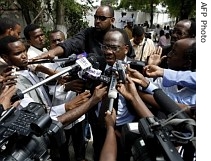2007年VOA标准英语-Media Watchdog Slams Recent Arrests of Somali J(在线收听)
Nairobi
11 April 2007
An international media watchdog has condemned the recent arrests of three television journalists following a press conference in Somalia. The group also expressed concerns about government-imposed restrictions on the media in the semiautonomous area of Puntland, a presidential stronghold. Cathy Majtenyi reports for VOA from Nairobi.
 |
| Top UN envoy to Somalia Francois Lonseny Fall adresses the media after his meeting with interim Somali president Abdullahi Yusuf at the presidential palace in Mogadishu, 18 Jan 2007 |
The TV executive directed a question to Mr. Yusuf that the president's spokesman did not appreciate.
The head of the Africa desk of Paris-based Reporters Without Borders, Leonard Vincent, describes to VOA what then took place.
"The journalist asked about the nominations in the official functions in the Somali administration," he recalled. "He was saying that the president was favoring his own clan and sub-clan - his family, I would say. This is something that angered really the spokesperson who said, 'This is the language of terrorists and you should be arrested.' And, in fact, these journalists, the TV crew of Universal TV was arrested."
In a strongly worded statement, Reporters Without Borders condemned the arrests, saying the behavior of the president's aides and supporters continues to undermine the rights of journalists and that security concerns should not be used, in the statement's words, to settle scores.
Somali government officials could not be immediately reached for comment.
In an interview with VOA last month, Somali Minister of Foreign Affairs Esmael Mohamud Hurreh said that his government's position is that, in his words, "the press is free," it should have access to every place, and government officials must cooperate with reporters.
Media in Somalia are finding it increasingly difficult to operate. Last month, security agents assaulted three journalists of the independent radio station Shabelle Media Network while they were investigating reports about Ethiopian troops.
"There is a very hostile climate between part of the private press and the government," added Mr. Vincent. "The government sees any criticism, any argument that is brought before them by the opposition as an act of hostility. We are saying that criticism should be possible in Somalia even if the security situation is very tense."
At the end of last month, the information ministry in Puntland, home of the president, banned all unauthorized conferences, lectures, and public events on media matters as well as the creation of media associations.
Vincent says he thinks the Puntland authorities are flexing their muscles by enacting these policies.
In its 2007 report, Reporters Without Borders expressed concern about the difficult conditions faced by Somali journalists.
The report says that 2006 was one of the most violent years for the press in a long time, with many journalists harassed by both the transitional government and the Islamic Courts Union, who at the time controlled much of southern Somalia.
The report says some 30 journalists were arrested by both sides last year.